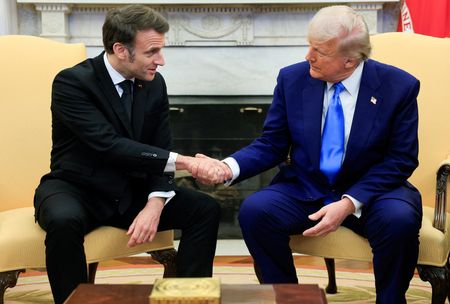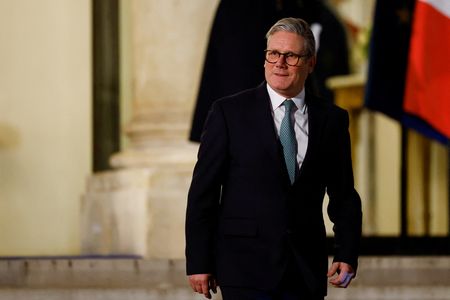By Andreas Rinke
BERLIN (Reuters) – Germany could approve a fund to boost defence spending before the outgoing parliament steps down next month, while leaving debate over state borrowing limits to new lawmakers elected on Sunday, an ally of vote winner Friedrich Merz said on Tuesday.
Merz faces tricky coalition talks and the prospect of an obstructive parliament after far-right and far-left parties surged.
Germany is considering a special fund for increased military spending as it faces a confrontational Trump administration and hostile Russia. A source in Merz’s conservative party said it could be hundreds of billions of euros.
Berlin is also expected to face a debate over easing constitutional limits on state borrowing, both to pay for the defence boost and to help lift the wider economy from the doldrums.
The two moves would each require two-thirds support in parliament, meaning success could depend on the composition of small parties which will change when the newly elected lawmakers are sworn in by March 25 at the latest.
The far-left Linke, which will have more seats in the new parliament, supports reforming the borrowing rules but opposes increased defence spending. The centrist FDP, which has seats in the outgoing parliament but failed to win seats in the new one, supports defence spending but opposes loosening the debt rules.
Asked on Deutschlandfunk radio if the outgoing parliament could create the defence fund before the new parliament is sworn in, Thorsten Frei, made clear this was a possibility.
“Very quick decisions, specifically in the area of foreign and security policy, could be necessary,” he said. But he contrasted this with a wider discussion of the borrowing limits, which he said should not be rushed.
Jens Spahn, another lawmaker in Merz’s conservative CDU party, said the next chancellor must be able to show increased defence spending by the time of the next NATO summit in June.
Merz, who warned the United States on Monday against turning its back on allies, also urged Europeans to build up their own defence capabilities, saying it was now “five minutes to midnight for Europe”.
Olaf Scholz’s outgoing government set up a 100 billion euro ($104 billion) fund to revamp Germany’s military following Russia’s 2022 full scale invasion of Ukraine, boosting German defence spending to the NATO target of 2% of GDP. But the fund is soon to run out and Merz and Scholz agree more is needed.
Shares in German defence firms rose on Tuesday morning on the prospect of more defence spending.
Military officials and lawmakers have lamented that the German army is less battle ready than when Russia invaded.
Merz has so far stopped short of endorsing a change to the debt brake, which imposes sharp limits on state borrowing. Outgoing Defence Minister Boris Pistorius, a Scholz ally, has urged Merz’s conservatives to loosen the debt brake to fund a military upgrade.
“An exception to the debt brake is practically unavoidable in order to ensure that the Bundeswehr is adequately equipped,” he told the Bild newspaper.
The defence ministry’s budget “will have to double to over 100 billion euros in the coming years due to necessary investments. We are talking about more than 3% of gross domestic product,” he said.
($1 = 0.9547 euros)
(Reporting by Andreas Rinke; Additional reporting by Ludwig Burger; Writing by Ludwig Burger and Matthias Williams; Editing by Peter Graff)










